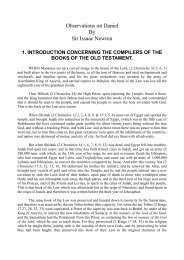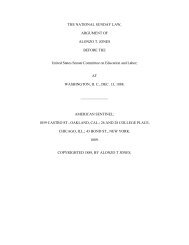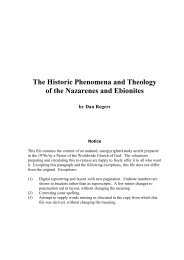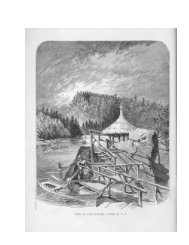THE EARLY CHRISTIAN SABBATH - Friends of the Sabbath Australia
THE EARLY CHRISTIAN SABBATH - Friends of the Sabbath Australia
THE EARLY CHRISTIAN SABBATH - Friends of the Sabbath Australia
Create successful ePaper yourself
Turn your PDF publications into a flip-book with our unique Google optimized e-Paper software.
The Early Christian <strong>Sabbath</strong><br />
Fa<strong>the</strong>rs, 2d Series, vol. 12, Page 7.<br />
Their agreement was well illustrated in <strong>the</strong>ir mutual suppression <strong>of</strong> <strong>Sabbath</strong><br />
keeping. It remained for a pope <strong>of</strong> Rome to denounce as anti-Christian those keeping <strong>the</strong><br />
<strong>Sabbath</strong> commandment <strong>of</strong> God. Gregory 1, named <strong>the</strong> Great, bishop <strong>of</strong> Rome from AD<br />
590 to 604, declared <strong>Sabbath</strong>keepers to be preachers <strong>of</strong> antichrist. He wrote:<br />
“Gregory, bishop by <strong>the</strong> grace <strong>of</strong> God to his well-beloved sons, <strong>the</strong> Roman<br />
citizens: It has come to me that certain men <strong>of</strong> perverse spirit have disseminated among<br />
you things depraved and opposed to <strong>the</strong> holy faith, so that <strong>the</strong>y forbid anything to be<br />
done on <strong>the</strong> day <strong>of</strong> <strong>the</strong> <strong>Sabbath</strong>. What shall I call <strong>the</strong>m except preachers <strong>of</strong> antichrist?” -<br />
Epistles, book 13: 1, in Labbe and Cossart, Sacrosancta Concilia, volume 5, column<br />
1511.<br />
Who was it that suppressed <strong>the</strong> <strong>Sabbath</strong> and emphasized Sunday observance? As<br />
we review <strong>the</strong> evidence, we answer. The Church <strong>of</strong> Rome. It is not surprising <strong>the</strong>refore to<br />
find catechism after catechism <strong>of</strong> <strong>the</strong> Roman Catholic Church admitting frankly, indeed<br />
claiming, that to <strong>the</strong> Church <strong>of</strong> Rome must go <strong>the</strong> credit for <strong>the</strong> elimination <strong>of</strong> <strong>the</strong> true<br />
<strong>Sabbath</strong> and <strong>the</strong> establishment <strong>of</strong> Sunday observance. This shift became effective during<br />
<strong>the</strong> fifth and sixth centuries, at <strong>the</strong> very period when <strong>the</strong> popes were consolidating <strong>the</strong>ir<br />
enormous ecclesiastical power.<br />
As <strong>the</strong> centuries rolled by, Sunday observance became increasingly a symbol <strong>of</strong><br />
<strong>the</strong> ecclesiastical power <strong>of</strong> <strong>the</strong> Roman Church. It was used by Rome as a challenge to <strong>the</strong><br />
Protestant leaders <strong>of</strong> <strong>the</strong> Reformation. Eck, <strong>the</strong> noted Catholic debater against Lu<strong>the</strong>r,<br />
had in <strong>the</strong> Leipzig disputation <strong>of</strong> 1519 forced <strong>the</strong> Protestant leader to concur in <strong>the</strong><br />
“heresies” <strong>of</strong> <strong>the</strong> great Bohemian reformer, Huss, who had been burned at <strong>the</strong> stake in<br />
1415. In 1533, writing fur<strong>the</strong>r against Lu<strong>the</strong>r, Eck used Sunday observance as an<br />
evidence <strong>of</strong> <strong>the</strong> authority <strong>of</strong> <strong>the</strong> Roman Church in matters <strong>of</strong> faith and religious practice.<br />
He wrote:<br />
“The Scripture teaches: Remember that you sanctify <strong>the</strong> <strong>Sabbath</strong> day; you will<br />
labor six days, and do all your work, but on <strong>the</strong> seventh day is <strong>the</strong> <strong>Sabbath</strong> <strong>of</strong> <strong>the</strong> Lord<br />
your God, etc., etc. Never<strong>the</strong>less <strong>the</strong> church has changed <strong>the</strong> <strong>Sabbath</strong> to <strong>the</strong> Lord's day by<br />
its own authority, concerning which you have no Scripture.” John Eck, Enchiridion<br />
Locorum Communium adversus Lu<strong>the</strong>ranos (Handbook <strong>of</strong> Commonplaces Against <strong>the</strong><br />
Lu<strong>the</strong>rans), printing <strong>of</strong> 1533, pages 4a, 5. (Translation by <strong>the</strong> author.)<br />
But <strong>the</strong> full force <strong>of</strong> this Catholic claim is clearly seen in <strong>the</strong> Council <strong>of</strong> Trent<br />
itself. On Sunday, January 18, 1562, Which opened <strong>the</strong> last session <strong>of</strong> that important<br />
council, <strong>the</strong> archbishop <strong>of</strong> Reggia, Caspar del Fossa, delivered a sermon in which he<br />
based <strong>the</strong> whole structure <strong>of</strong> <strong>the</strong> authority <strong>of</strong> <strong>the</strong> Catholic Church upon <strong>the</strong> fact that “<strong>the</strong><br />
<strong>Sabbath</strong>, <strong>the</strong> most glorious day in <strong>the</strong> law, has been changed into <strong>the</strong> Lord's day.” - Labbe<br />
and Cossart, Sacrosancta Concilia, volume 14, columns 1253, 1254.<br />
Commenting upon this, Heinrich julius Holtzmann, German scholar and<br />
outstanding authority on <strong>the</strong> question <strong>of</strong> ecclesiastical tradition, says <strong>of</strong> <strong>the</strong> significance<br />
<strong>of</strong> Del Fossa's position:<br />
“At last at <strong>the</strong> final opening [<strong>of</strong> <strong>the</strong> council] on January 18, 1562, <strong>the</strong>y rid<br />
<strong>the</strong>mselves <strong>of</strong> all hesitation; <strong>the</strong> archbishop <strong>of</strong> Reggia made an address in which he<br />
declared openly that tradition was elevated above <strong>the</strong> Scripture. On this account <strong>the</strong><br />
authority <strong>of</strong> <strong>the</strong> Church could not at all [<strong>the</strong> archbishop maintained] be tied to <strong>the</strong><br />
authority <strong>of</strong> Scripture, because <strong>the</strong> former had, not according to <strong>the</strong> ordinance <strong>of</strong> Christ,<br />
36

















